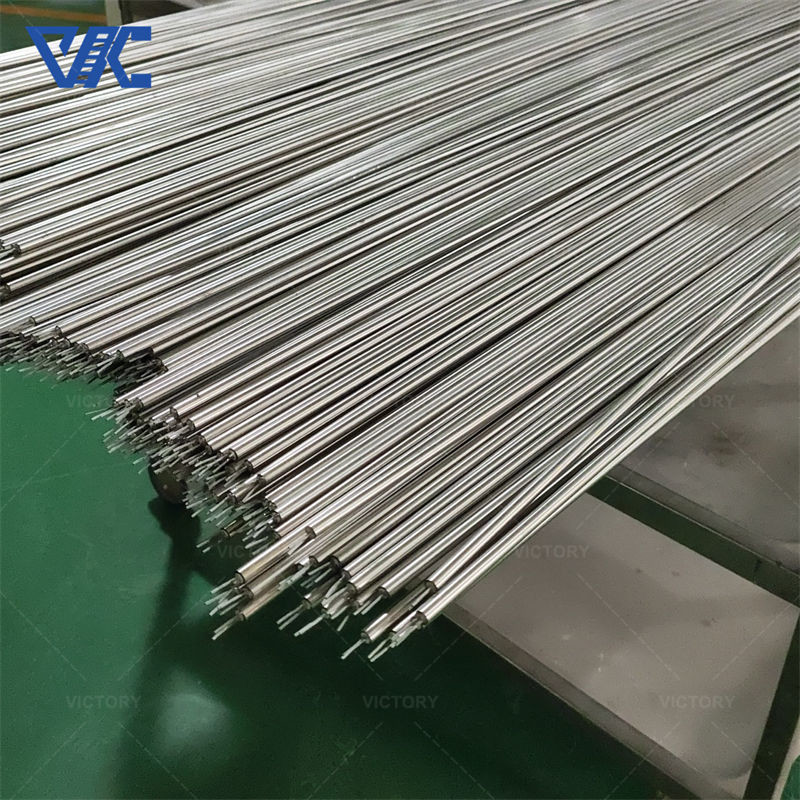Changzhou Victory Technology Co., Ltd |
|
Verified Suppliers
|
|
Introduction:
MI thermocouple cables play an important role in scientific research and laboratory applications. It can measure temperature changes stably and provide accurate temperature data. Whether it is physics, chemistry or materials science, MI thermocouple cables can meet the needs of scientific researchers for temperature measurement and control. They are widely used to study the properties and behavior of substances under different temperature conditions, as well as to study phase changes, thermodynamic properties and material properties.
In laboratory applications, MI thermocouple cables are also widely used in various experiments and tests. Whether it is temperature monitoring of chemical reactions, temperature control in biological experiments, or temperature regulation in material performance testing, MI thermocouple cables can provide accurate and reliable temperature measurement and stable control.
The product parameters of MI thermocouple cables include conductor material, sheath material, diameter range, insulation material and temperature range, etc. Appropriate selection of product parameters can meet the specific needs of laboratory applications and ensure the accuracy and stability of temperature measurements.
Product Features:
Advantage:
Specific applications:
Other relevant knowledge:
The temperature measurement principle of the armored thermocouple is based on the thermoelectric effect, in which two different metal wires generate a thermoelectric potential difference through the thermoelectric effect, and the temperature is determined by measuring the thermoelectric potential difference.
In laboratory applications, the selection of armored thermocouples
should be based on experimental conditions, requirements and
measurement ranges. Different armoring materials and specifications
are suitable for different experimental environments and
temperature ranges.
Armored thermocouples can be used with temperature measuring
instruments (such as thermometers, data acquisition systems) to
obtain and record temperature data.
When using armored thermocouples for temperature measurement,
attention needs to be paid to protecting the armored cable from
mechanical damage or environmental corrosion to ensure the accuracy
and reliability of the measurement.
Armored thermocouples may encounter some limitations and challenges
in some special application areas (such as high-temperature molten
metal, high-pressure environments, etc.), so the actual situation
needs to be considered comprehensively when selecting and using
them.
In short, as a common temperature measurement device, armored thermocouples have extensive applications and important roles in scientific research and laboratory applications. By measuring temperature, they provide important data support for researchers and promote various Scientific progress and technological innovation in the field.
Parameter:
Code | Wire Component of the thermocouple | ||
+Positive leg | - Negative Leg | ||
N | Ni-Cr-Si(NP) | Ni-Si-magnesium (NN) | |
K | Ni-Cr(KP) | Ni-Al(Si) (KN) | |
E | Ni-Cr(EP) | Cu-Ni (EN) | |
J | Iron (JP) | Cu-Ni (JN) | |
T | Copper (TP) | Cu-Ni (TN) | |
B | Platinum Rhodium-30% | Platinum Rhodium -6% | |
R | Platinum Rhodium-13% | Platinum | |
S | Platinum Rhodium -10% | Platinum | |
Material | Type | Grade | Working temperature (deg) | Tolerance | Standard | |
Long Term | Short Term | |||||
NiCr-NiSi | K | 1 | -40~1100 | -40~1300 | ±1.5 deg | GB/T 2614-1998 |
2 | ±2.5 deg | |||||
NiCr-CuNi | E | 1 | -40~800 | -40~900 | ±1.5 deg | GB/T 4993-1998 |
2 | ±2.5 deg | |||||
Fe-Constantan | J | 1 | -40~600 | -40~800 | ±1.5 deg | GB/T 4994-1998 |
2 | ±2.5 deg | |||||
Cu-CuNi | T | 1 | -200~300 | -200~400 | ±0.5 deg | GB/T 2903-1998 |
Outer Sheath(mm) | core wire Dia.( mm) | Outer Sheath(mm)o core wire Dia.( mm) | Length(m) | |||||
Out Dia | Wall Thickness | K,N,E,J,T Types | S,R,B Types | K,N Types | E,J,T Types | S,R Types | B Types | |
0.5 | 0.05-0.10 | 0.08-0.12 | ... | SS304, SS321, SS316, SS310, INCL600 | SS30, SS32, SS316 | INCL60, INCL800 | INCL60, INCL800 | 500 |
1.0 | 0.10-0.20 | 0.15-0.20 | ... | 300 | ||||
1.5 | 0.15-0.25 | 0.23-0.30 | ... | 200 | ||||
1.6 | 0.16-0.26 | 0.26-0.36 | ... | 200 | ||||
2.0 | 0.25-0.35 | 0.40-0.50 | 0.25-.030 | 180 | ||||
3.0 | 0.38-0.48 | 0.50-0.60 | 0.30-0.40 | 80 | ||||
3.2 | 0.48-0.58 | 0.58-0.68 | 0.30-0.40 | 75 | ||||
4.0 | 0.52-0.62 | 0.60-0.70 | 0.35-0.40 | 70 | ||||
4.8 | 0.73-0.83 | 0.75-0.85 | 0.40-0.45 | 40 | ||||
5.0 | 0.78-0.88 | 0.80-0.90 | 0.40-0.45 | 40 | ||||
6.0 | 0.98-1.08 | 0.90-1.10 | 0.45-0.50 | 30 | ||||
6.4 | 1..05-1.15 | 1.02-1.12 | 0.45-0.50 | 30 | ||||
8.0 | 1.30-1.44 | 1.30-1.40 | 0.45-0.50 | 20 | ||||
12.7 | 1.75-1.90 | 1.95-2.05 | ... | 10 | ||||

Calibration | Tolerance | ||
Special Limits (Grade I) | Standard Limits (Grade II) | Temperature Range (℃) | |
K (Chromel vs Alumel) | ±1.5°C or ±0.4% | ±2.5°C or ±0.75% | -40~1000 |
J (Iron vs Constantan) | -40~750 | ||
E (Chromel vs Constantan) | -40~800 | ||
T (Copper vs Constantan) | ±1°C or ±0.75% | -40~350 |
 |  |